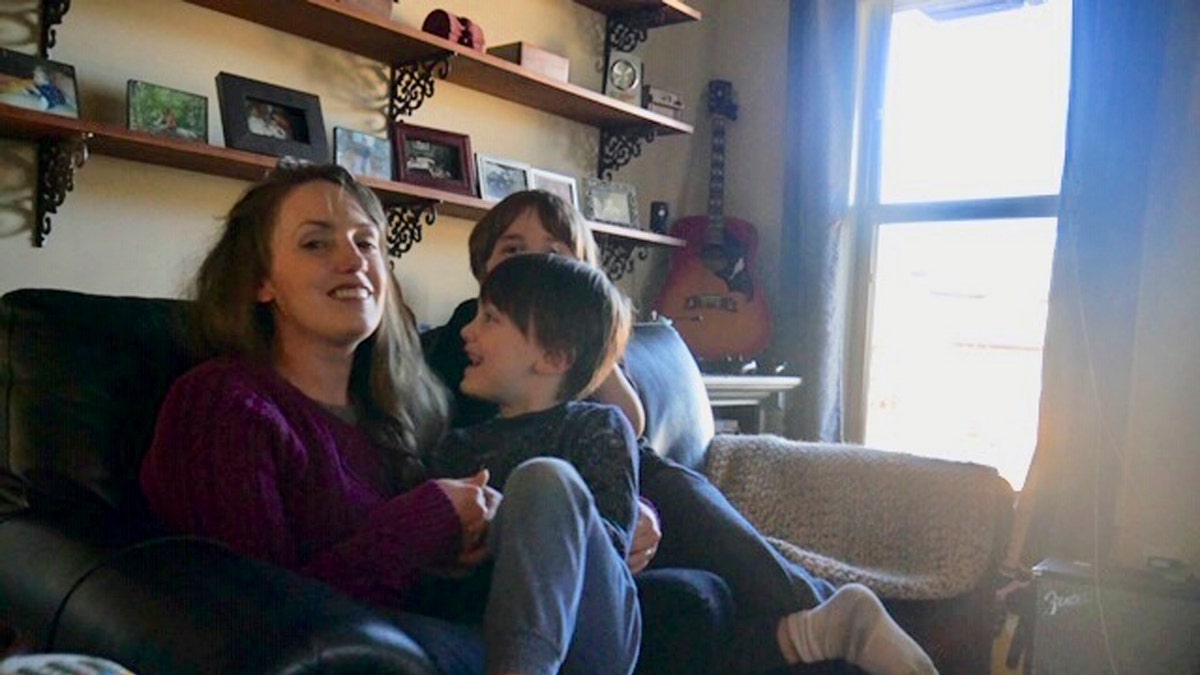
In this 2019 photo provided by Americans United for Separation of Church and State, Aimee Maddonna smiles while sitting with her children at her home in Simpsonville, S.C. The South Carolina mother has sued both the state and federal government, saying she’s a victim of religious discrimination on the part of a federally funded foster-care agency that turned her down because of her Catholic faith. Maddonna says the agency in 2014 initially encouraged her to become a foster parent but cut off ties once realizing that she is Catholic and not a “born-again” Christian, as the agency’s internal rules require. (Courtesy of Aimee Maddonna/Americans United for Separation of Church and State via AP)
COLUMBIA, S.C. – A Catholic mother accuses a federally funded South Carolina foster agency of not working with her because she's "not the right kind of Christian," her lawyers say.
In a federal lawsuit filed Friday, Aimee Maddonna and her lawyers say Miracle Hill Ministries is unconstitutionally discriminating against non-Protestants. The lawsuit challenges a waiver granted this year to the Greenville agency, which previously has come under fire for denying services to same-sex couples and non-Christian families.
Last year, South Carolina Gov. Henry McMaster requested a waiver exempting the state from an Obama-era regulation preventing publicly licensed and funded foster care agencies from servicing specific religions. That request was granted last month.
But years before Miracle Hill's actions toward non-Christians became an issue, Maddonna says the agency first encouraged her to become a foster parent but then cut off ties when they realized the Simpsonville mother is Catholic and not a "born-again" Protestant, as the agency's rules require.
Maddonna first reached out to Miracle Hill in 2014, when the mother of three decided that it was time to welcome more children into her home. Maddonna, who grew up in a household full of foster children, many with special needs, told The Associated Press in an exclusive interview she wanted her children to be able to develop the same foster sibling bonds she had.
"I wanted to open up my family and my home to kids in need," Maddonna said. "I have the view that every child has the ability to enrich the lives of adults around them, too."
For weeks, Maddonna says conversations continued with Miracle Hill officials, who set up a final interview before she was to be approved as a foster parent. In a conversation ahead of that meeting, Maddonna says she was asked to give the name of her church.
"By the name, you can tell it's a Catholic parish," Maddonna said. She says the Miracle Hill representative "immediately responded back with, 'I'm sorry, we only employ volunteers and mentors who are Protestant Christian.'"
"I've never considered myself a religious minority until that moment," Maddonna said. "I had to tell my kids that, because we're Catholic, we can't take these kids out for ice cream and cheer them on at their games. I was devastated."
In the last fiscal year, Miracle Hill received nearly $600,000 in state and federal funding, the organization's president has said.
Rachel Laser - president and CEO for Americans United for Separation of Church and State, whose lawyers are handling Maddonna's case - says that despite the waiver's specific language concerning Christianity, Miracle Hill is unconstitutionally discriminating against non-Protestants.
"This is a problem that the government has caused. If Miracle Hill were a private entity not accepting state and federal money, then they could decide with their private money whom they served," Laser said. "Aimee isn't the right kind of Christian, so they don't serve her."
Named in the lawsuit are Gov. McMaster, the South Carolina Department of Social Services and the federal Department of Health and Human Services. A spokesman for McMaster did not immediately return messages Friday seeking comment on the lawsuit.
Federal officials declined to comment on pending litigation, instead pointing AP to a statement issued when the waiver was approved in which Lynn Johnson, assistant secretary for children and families, said the "agency should not — and, under the laws adopted by Congress, cannot — drive faith-motivated foster care providers out of the business of serving children without a compelling government interest."
On an online form used to request more information about the foster care program, Miracle Hill describes itself as "a non-denominational, Christian organization based upon a protestant statement of faith." An informational sheet provided to AP describes a viable foster parent as "a born-again believer in the Lord Jesus Christ as expressed by a personal testimony and Christian conduct," going on to note further that the applicant must be an active participant of a protestant congregation.
An online frequently-asked-questions section notes that, while Jews or Catholics "wouldn't be a good fit for Christian leadership roles at Miracle Hill, such as in our foster-care and mentoring programs," the organization can help connect them with other groups where they can serve.
Maddonna recently reached out to Miracle Hill again, to see whether their policy had changed, but she said she received no response.
"When most people think of people being turned away, they think of equally despicable circumstances where a gay couple or a Jewish couple is turned away," Maddonna said. "If you don't protect the rights of everybody, it sets a precedent that will eventually touch on you."
___
Meg Kinnard can be reached on Twitter at http://twitter.com/MegKinnardAP .









































